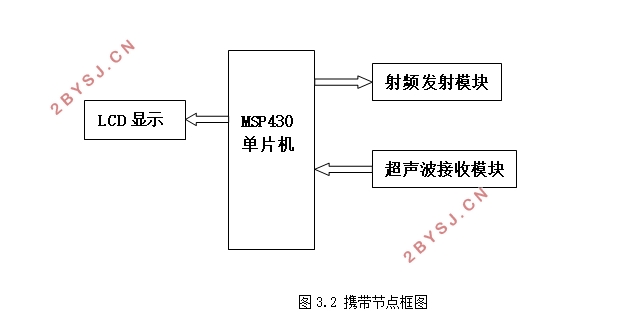基于MSP430单片机的超声波室内定位系统设计
无需注册登录,支付后按照提示操作即可获取该资料.
基于MSP430单片机的超声波室内定位系统设计(论文10600字)
摘要:近年以来,超声波技术发展迅速,测距精度大幅提高,超声波室内定位得以实现。并且GPS在室内测量时,受接收卫星信号影响,很多情况下无法进行准确测量。针对实际需求,设计了基于MSP430单片机的超声波室内定位系统,本系统以MSP430为主控芯片,包含射频发射和接收模块,超声波发射和接收模块,以及LCD显示模块。射频模块用以同步各收发模块,超声波模块结合MSP430用以获取到达时间,并通过算法来处理得到携带节点的位置坐标。本文讨论的超声波室内定位技术可以实现人员、物体等在室内空间中的位置监控,这一技术可以弥补卫星定位在建筑物内无法定位的缺陷。
关键词:MSP430单片机;到达时间算法;超声波测距;LCD显示;室内定位
Design of ultrasonic indoor positioning system based on MSP430
Abstract: in recent years, with the rapid development of ultrasonic technology, the accuracy of range measurement has been greatly improved, and the indoor positioning of ultrasound has been realized. Moreover, when GPS is being measured indoors, it is affected by the received satellite signals, and it can not be measured accurately in many cases. In view of the actual demand, design the ultrasonic indoor positioning system based on MSP430 MCU, this system uses MSP430 as the main control chip, including RF transmitter and receiver module, ultrasonic transmitting and receiving module and LCD display module. The RF module is used to synchronize each transceiver module, and the ultrasonic module is combined with MSP430 to obtain the arrival time, and the position coordinates of the mobile nodes are processed by the algorithm. The ultrasonic indoor positioning technology discussed in this paper can realize the position monitoring of personnel, objects and so on in indoor space. This technology can make up for the localization of satellite positioning in buildings.
Key words: MSP430 SCM; arrival time algorithm; ultrasonic ranging; LCD display; indoor positioning

目 录
1 绪论 3
1.1研究背景 3
1.2研究目的 3
1.3研究意义 3
1.4 本文的研究任务 4
1.5本论文结构 4
2 超声波定位系统原理及器件的选用 5
2.1 超声波与超声波传感器 5
2.1.1 超声波简介 5
2.1.2 超声波传感器及其特性 5
2.2 超声波的定位原理 6
2.2.1 超声波测距方法 6
2.2.2 超声波定位原理 6
2.3器件的选用 7
3.系统分析和系统总体设计 10
3.1超声波测厚系统的指标要求 10
3.2系统组成 10
3.2.1系统空间分布 10
3.2.2携带节点系统框图 10
3.2.3固定节点系统框图 10
4系统硬件设计 12
4.1单片机MSP430主控模块 12
4.2超声波接收模块 12
4.3射频发射模块 13
4.4 超声波发射模块 14
4.5 射频接收电路 14
4.6 LCD显示 14
5系统的软件设计 15
5.1系统总体软件流程 15
5.2 携带节点软件流程 17
5.3 固定节点软件流程 18
6 实际测试和结果分析 19
6.1 测试条件 19
6.2 测试数据 19
6.3实验结论 19
6.4误差分析 19
6.5温度补偿的讨论 19
7总结 21
参考文献 21
致谢 22
